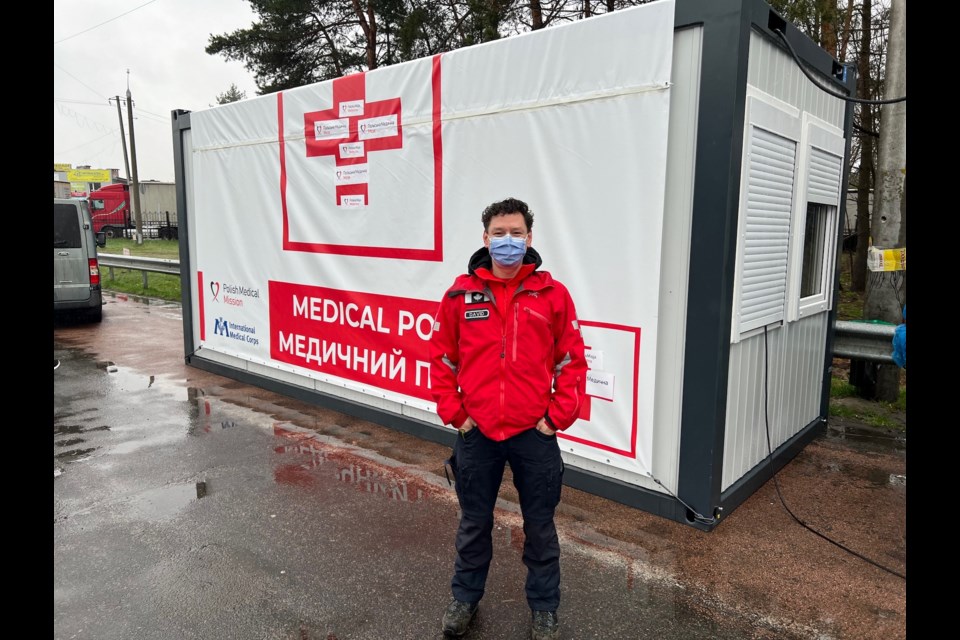On some occasions, when Ukrainians realize that a volunteer medical team led by a Squamish resident is not there for any other reason but to help, it reduces them to tears.
"Lots of them will come up to us and say, 'You're Canadian. So why are you here? Do you have family ties to Ukraine?'" said David Thanh, leader of the Echo Team for the Canadian Medical Assistance Teams, or CMAT.
"And some people in our group have family ties to Ukraine, but, overwhelmingly, most of them don't. They just have that Canadian spirit of, 'I need to go help.' And when we tell them, 'No, we don't have any family ties here. We just came because we felt like we needed to help,' some of them are brought to tears."
Thanh, a Paradise Valley resident since 2011, said many people in Ukraine feel like the world has turned its back on them, leaving them alone to face the Russian invasion.
However, finding out that other people from around the world care can be an overwhelming feeling for some Ukrainians.
"We see the raw emotion and these people saying, 'Wow, you came from the other side of the world to volunteer your time to pay your own expenses to come here to help people you don't even have ties to,' and just being just so awestruck and so grateful," said Thanh. "That's probably the thing that hits home the most."
Thanh, who is a member of Squamish Search and Rescue, is in charge of leading his team of about 10 medical professionals, including doctors, nurses and paramedics.
Currently, he works as a fire warden for the BC Wildfire Service out of Squamish, doing patrols and working logistics for large fires. Previously, he was one of two coroners for the BC Coroners Service for the Sea to Sky.
Since arriving on April 17, a typical day for Thanh involves making security and risk assessments and determining where and how the team will deploy.
Generally, the team spends its nights in Poland and, each morning, crosses the border into western Ukraine each day.
Many of the people the group tends to are those who have left more dangerous parts of Ukraine, but haven't quite decided to leave the country. They are staying near the Polish border in case evacuation is necessary, but hope to return to their homes when the war ends.
As a result, Thanh's team has taken the role of stand-in family doctors and pharmacists for those who no longer have access to those services.
In the areas where they operate, facilities such as university dorms have been converted to shelter displaced people.
"These are people that no longer have access to health care services," said Thanh. "They no longer have access to family doctors; they may or may not have prescriptions with them. So …we're taking the place of their family physician, we're providing pharmaceutical services, so we have a mobile pharmacy with us."
In helping these people out, they've come to make connections.
Thanh spoke of a pair of men who'd driven 24 hours straight from Kharkiv, and were seeking medical attention for back pain.
"They were telling their story of getting out, and then he finished it up with, 'You know, the fishing is so good here. And, and when you come back to Ukraine, when the war is over, look me up, and we'll take you fishing.'" Thanh said.
A more dramatic example involved a person who escaped an area that Russian forces heavily shelled.
"He was in the wrong place at the wrong time, [but while] he was wearing a backpack with water bottles in it, he was hit with 20 pieces of shrapnel," said Thanh. "Most of them embedded in his legs and back. The one piece of shrapnel that would have killed him hit the water bottle that was in his backpack and burst the water bottle. Had it not been for those water bottles, he definitely would have been dead."
The CMAT team arranged a transfer to bring the patient to Austria, where a specialist could provide an assessment and possibly remove the shrapnel.
There are also many cases of post-traumatic stress disorder, or PTSD, added Thanh.
One of the ways that people back home in Squamish can contribute is by donation to organizations like the Canadian Medical Assistance Teams, he said.
Groups like his are 100% reliant on donations, and missions can be lengthy and expensive.
However, those who don't have money to spare can always simply say a few kind words.
Thanh shared that he was supposed to be helping out for a two-week deployment. However, CMAT told him there was no leader to replace him for the following two weeks.
As a result, they asked him to stay for longer.
"At first, I was a little hesitant, because it is draining to be here, especially to be leading a team," said Thanh.
But a steady flow of positive comments from home helped refill his cup.
"That kind of support from people back home — it made me easily say, 'Yeah, I'll stay for the next deployment,'" he said.
To find out more about CMAT or to donate, go to the organization's website.



